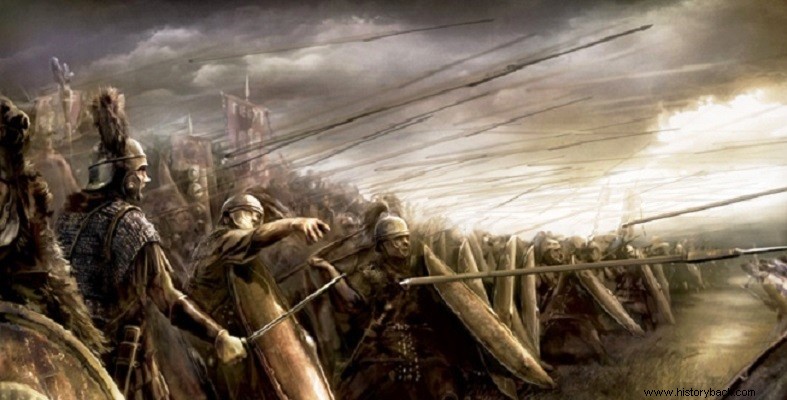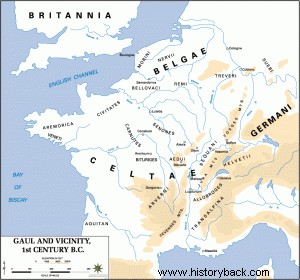
During the winter of 58 to 57 BC. alarming information began to reach Caesar's staff about the activities of the Belgae. The ancient Belgians inhabited the areas of today's northern France, Belgium, Luxembourg and part of today's Netherlands. Caesar considered them as the most powerful opponents.
Caesar defeated the Belgae in a first battle and forced the tribes to return, each to its own place. One of them was that of Nervia. The Nervii were, according to Caesar, the most ferocious Belgian tribe and had even convinced their neighbors the Atrevatus and Viromandus to fight alongside them. They also awaited the arrival of an auxiliary body of Atuatuks.
In the country of the Nervians, extending beyond the river Savi (today's Sambr) there were dense forests and many marshes. The Nervii, who did not have cavalry, built hedges of bushes and thorns and behind them faced the attacks of the rival horsemen.
After a march of three days, Caesar reached the right bank of the Savidos river. He was informed by his scouts that the Nervii were encamped on the opposite bank of the river and were awaiting him with considerable forces. But some of the Gallic and Belgic scouts defected to the Nervii and informed them of the movements of the Roman army. Meanwhile Caesar was marching with his six war-experienced legions in front, in battle array. Eventually a suitable location was identified and a fortified camp would be built there.
Surprise Attack
But then thousands of Nervians appeared from the forest and rushed forward with terrible cries against the Romans. Their momentum swept the Roman vanguards, and in a few moments they were close to the men who were building the camp. Without being surprised, Caesar showed all his skill.
Despite the rapid advance of the enemy, he managed to give the signal to the men of the six legions to take up arms, he galloped and brought back divisions that had been withdrawn in search of materials for the fortification of the camp, he ordered his units into battle formation and animated them . By then the enemies had approached to 150-200 meters.
Although many of his soldiers had not even had time to put on their helmets and unwrap their shields from their waterproof leather coverings, yet their training and discipline and the courage and coolness of their leader enabled the Romans to engage with the enemy without losing their coherence.
And the soldiers of the IX and X Legions, after throwing their javelins and stopping the enemies, counterattacked against them, at the moment when they began to collapse from the speed of the onslaught and the weight of the losses from the Roman missiles. /strong> Soon the Belgians on the other side had fled. The Romans pursued them as far as and beyond the river.
The Romans under collapse
In another part of the front, however, the Nervii, taking advantage of a gap created in the Roman line, a consequence of the surprise suffered by the Romans, managed to pass to the rear of the Roman battle line. Attempts by the Roman cavalry and skirmishers to stop the enemy infiltration were of no avail. The allied Galatian divisions quickly lost their courage and fled in disorder. The battle seemed completely lost for Caesar, whose army was in danger of complete annihilation.
Caesar, however, hastened on horseback to the horn threatened with collapse. There he calmly took the shield of a soldier and calling out by name the names of the centurions of the divisions that had been retreating under the weight of the enemy's pressure, he called them to follow him and as a simple soldier rushed into battle. Thanks to his courage the morale of the men was revived. Little by little and despite the continuing unbearable enemy pressure, the breach in the front was restored.
The Roman army was now fighting on two fronts. In a little while, however, the famous X Legion, having defeated the enemies opposite it, turned to the right and in turn flanked the Nervius. At the same time, the fleeing Roman cavalry began to regroup. The critical moment of the battle had passed. The discipline of the men and the unimaginable composure of their commander had done their miracle. It was now the Nervians' turn to pay the price for their recklessness. Now trapped between the Roman army and the river, the Nerviians fought truly heroically, to the last.
Haunted, like wild beasts before their relentless hunters, the Nerviians continued to fight over the corpses of their comrades. They grabbed the arrows and javelins from the corpses of their fellow warriors and hurled them again at the Romans.
But there was no hope for these brave men, as long as they continued to fight and did not surrender. The legionnaires, hidden behind their shields, cut them to pieces. Human limbs were being cut off in an instant, screams of pain and moans of death filled the air. Soon there was silence. The Nervian warriors had been decimated. It is a question whether a few dozen of them survived.

